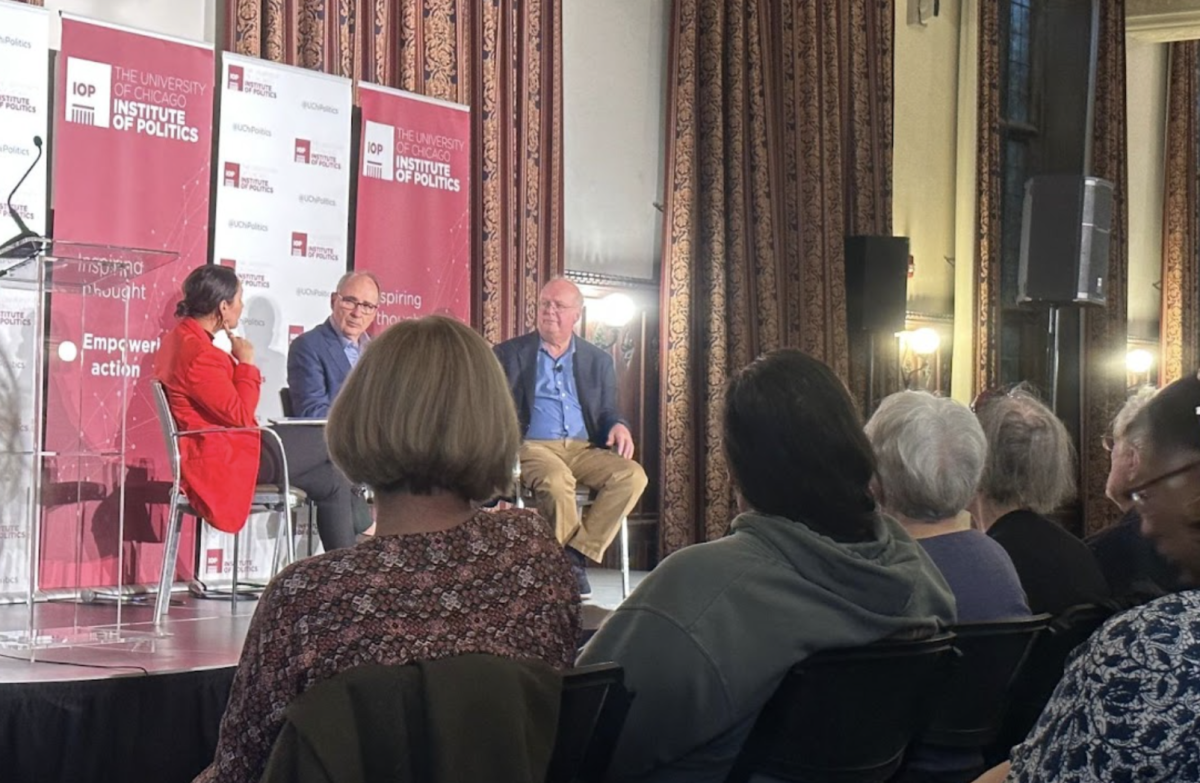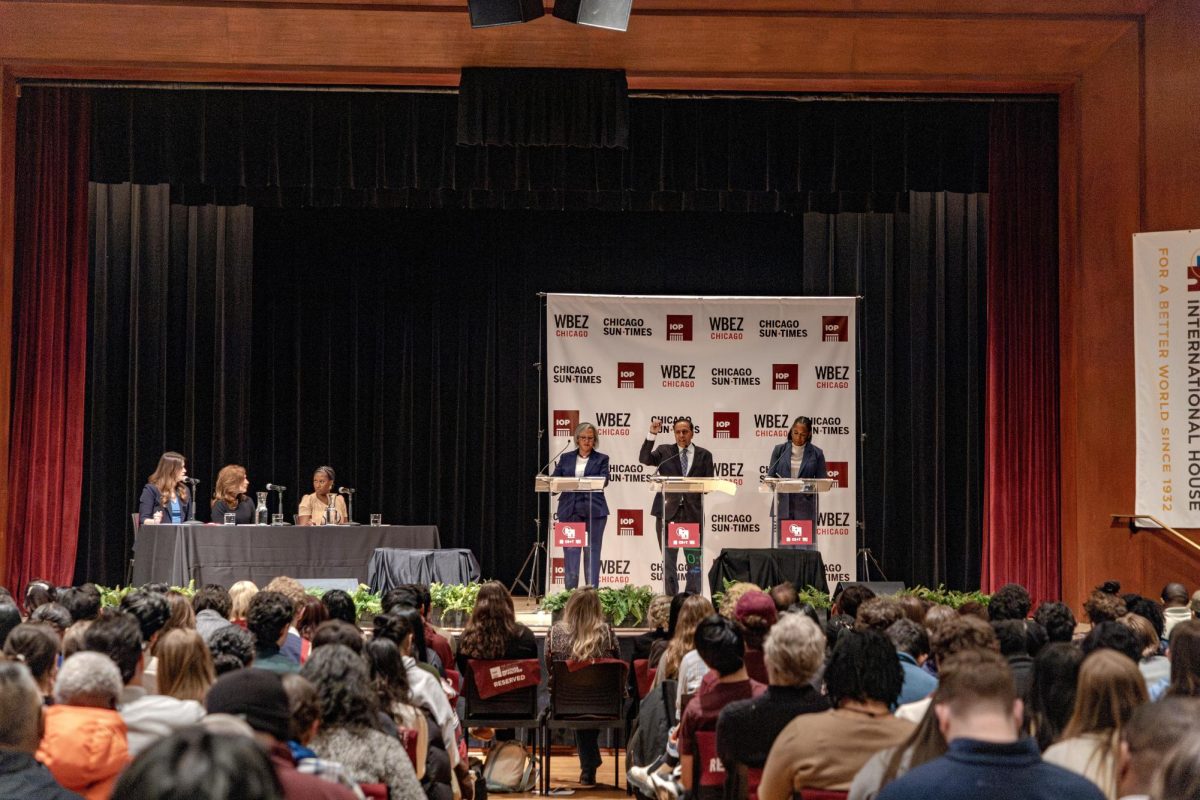On October 17, David Axelrod, former chief strategist to the Obama campaigns and founding director of the Institute of Politics (IOP), sat down with Karl Rove, former senior advisor to President George W. Bush, to analyze the upcoming 2024 presidential election. The event, entitled “Battleground Banter,” was part of the IOP’s Speaker Series for autumn quarter.
NBC journalist Ali Vitali moderated the discussion. She began by asking both speakers to comment on the accuracy and usefulness of polling in the modern day. Axelrod called public polls “a public menace,” emphasizing the lack of concrete information they provide during such competitive races.
“People assign too much power to a two-point difference,” Axelrod said.
Rove concurred, citing his sheet full of each day’s polling information and the shifts from the days prior. Of the 21 polls he tracks, Rove claimed the difference in “16 of the 21 [polls is] less than a point.”
As the polling pertains to the 2024 election, Axelrod and Rove came to the same conclusion: it’s the closest race they’ve ever seen.
According to Rove, one of the factors contributing to the competitiveness of this race is the dearth of battleground states.
“In 2000, when we ran, the battleground states were Maine, New Hampshire, Florida, Ohio, Michigan, Wisconsin, Tennessee, Arkansas, Oregon, Iowa, Pennsylvania, Missouri…” Rove said. “The seven in this election are the fewest I’ve ever seen.”
Despite there being seven battleground states, however, Axelrod noted that both campaigns are focusing primarily on Pennsylvania, the largest electoral prize of the seven with 19 electoral votes.
“It’ll be very difficult for [Harris] to win without Pennsylvania,” Axelrod said.
Another focal point of the discussion was the altered context of the race since President Biden’s exit. Both speakers agreed Biden was bound to lose prior to his departure.
“Trump led among voters in categories like ‘mental acuity,’ ‘honest and trustworthy,’ ‘strong leader,’ as well as many others when Biden was in the race,” Rove said. “Harris [now] leads in all of those categories except for ‘strong leader.’”
The conversation then pivoted to their advice for the respective campaigns. Axelrod examined the Trump campaign’s strategy: tie Harris to the border and the economy to make her the incumbent. He called presidential coverage “an MRI for the soul,” noting that Trump’s biggest weakness has been “when he says something crazy. That becomes the story.”
For Harris, the feedback was more complex. According to Axelrod, it feels like she “needed a second act” following the initial wave of support, the DNC, and the debate. Both agreed she should continue making appearances similar to the Fox News interview she conducted with Bret Baier on October 16.
Rove’s advice for Trump echoed some of that same sentiment:
“He [Trump] needs to get out of his bubble and let other people do the talking for him sometimes.” Rove referenced the speeches preceding Trump’s at the RNC as “compelling and humanizing. [Trump’s] speech was 62 minutes of crazy in between 26 minutes of a very good one.”
Both felt the election would hinge on who could paint the better narrative of change. Rove didn’t feel either was succeeding right then.
However, Rove said he felt Harris could make a stronger argument that she was the candidate who could bring better change: “Kamala’s done more substantive things with policy, like the mortgage assistance and the small business tax credit. Whether you like them or not, there are numbers attached to it,” Rove said. “Trump can’t simply say: I’ve made America great again once; I’ll do it again.”
Eventually, the talk shifted to one such national issue: abortion access. Axelrod pointed out that, while voters have accused Kamala of being scripted and less compelling on certain issues, “[abortion] seems to be a really authentic issue for her. Voters like that.”
To appeal to conservatives, Rove encouraged the Harris campaign to focus less on the who (Dick and Liz Cheney, Adam Kinzinger) and more on the what (substance), referencing Trump’s promise to pardon the January 6 insurrectionists.
“Talk about what appeals to conservatives,” Rove said. “Be more centrist. It’s more powerful to focus on a specific thing.”
As the discussion came to a close, Axelrod and Rove began to emphasize the importance of the personal element in politics. Beyond people “being sick of the scorched earth politics,” Axelrod spoke about a point of common humanity between himself and Rove. Both lost a parent to suicide, which was the catalyst for them beginning to speak together, a now common occurrence.
Axelrod closed with a story about the Affordable Care Act (ACA) and how personal it was to him. He has a daughter with a pre-existing condition and his family nearly went bankrupt to afford and manage her insurance. When Axelrod thanked Obama after the ACA passed, the president’s reply was simply: “That’s why we do the work.”
Part of that reconciliation, both agreed, comes with a recognition of the good that government can do in helping people.
At the panel’s conclusion, Axelrod and Rove agreed that they both had no idea who’s going to win. But, as Obama once told Axelrod, each agreed that “this stuff would be really interesting if we weren’t in the middle of it.”
















Melissa / Oct 22, 2024 at 10:08 pm
What is missing here is any substantive reflection on how the political landscape has shifted beyond their comprehension. Notice how they dance around the key issues, such as the failures of DEI policy in elite universities like the U of C. No one is willing to discuss Ms. Hariss’s or Mr. Obama’s DEI status (Ms Harris being doubly expendable owing to her genitals). The truths are too inconvenient. Don’t fit the narrative. Why? “Not to join gangs, not to be violent, not to kill, not to hit pregnant women, etc.” To get a proper education, get a job and to stay out of trouble. They did it (their skin privilege notwithstanding). And we’d ask ourselves why others like them are incapable. OH, they are? But they’re led to believe otherwise by virtue signaling coddlers like Ms. Journey and Clifford Ando? Got it!!
—Melissa, AB, MA